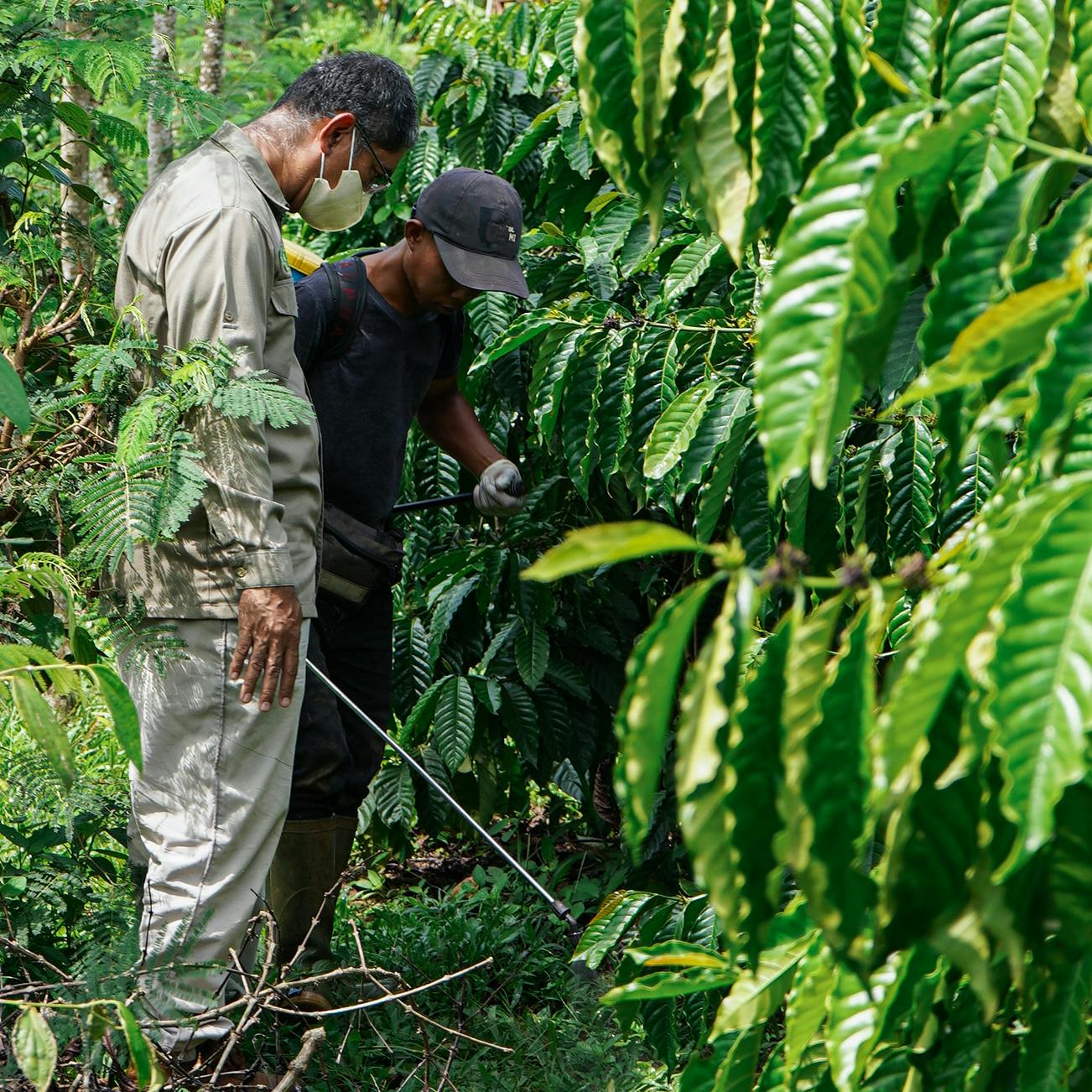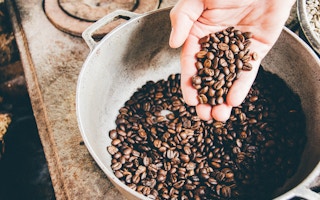Many people enjoy a hot cup of coffee to start their day or to relax during the weekends, making coffee one of the most heavily traded commodities in the world. As the world’s third-largest producer of coffee beans and a major exporter, Indonesia’s coffee industry helps create employment, generate income, and alleviate poverty, especially for rural communities in the country.
To maintain yield and quality, farmers often use chemicals such as pesticides to protect coffee plants from insects, pests, and weeds. However, pesticide residue can contaminate the ground and coffee beans and may cause rashes, nausea and other diseases in the long term including cancer and reproductive harm.
Pesticides also threaten plants, animals, insects and can contaminate waterways, directly affecting fish or reducing their food sources. They can also harm or disrupt the ecosystem of microorganisms and non-target organisms within the soil, or life forms that are not intentionally targeted by the pesticide.
For instance, pesticides used in cruciferous vegetables have been linked to a decline in soil arthropods – organisms that play an important role as decomposers and predators of pests. “A decrease in soil arthropods can lead to a reduction in overall biodiversity, and upset the soil’s natural balance,” said Dr Ir Dadang, a professor at the Department of Plant Protection, IPB University.
Minimising pesticide residue in food is therefore crucial in ensuring consumer safety. To achieve this, the World Health Organisation (WHO) worked with the Food and Agriculture Organisation (FAO) to establish Maximum Residue Limits (MRL) for pesticides, which refers to the highest level of pesticide residue levels tolerated in food or feed when pesticides are applied correctly, in accordance with Good Agricultural Practices (GAP). They are set well below safety standards to ensure food produced with pesticides is safe to consume.
Many importer countries set their own MRL requirements. For example, the European Union has set its MRL and enacted several regulations for exporters to sell coffee in Europe. Where no specific MRLs are set, the EU has set a general MRL level of 0.01 mg/kg. It has also enhanced scrutiny of the use of glyphosate, a herbicide widely used to kill weeds and other unwanted plants.
The challenges for smallholder farmers
Smallholder farmers in Indonesia make up more than 90 per cent of coffee farmers in Indonesia. They are now faced with the challenge of meeting MRL requirements for pesticides to enter foreign markets.
One issue is cost, with farmers having to bear additional costs to purchase different types of pesticides or invest in alternative pest control methods. They also have to adjust to new pesticide application methods such as reducing the amount or frequency of pesticides used.
In addition to setting MRLs, many international markets also require coffee to be certified as organic or fair trade. “These certifications can require farmers to meet specific requirements related to pesticide use and other farming practices, which can be difficult for smallholder farmers to meet without additional support or training,” said Eman Putra, the former executive director of Sustainable Coffee Platform of Indonesia (SCOPI), a non-profit organisation comprising stakeholders in the coffee industry in Indonesia.
Since many smallholder farmers depend on coffee exports as a major source of income, being unable to sell to foreign buyers due to MRL requirements poses risks to their livelihoods, Putra added.
How climate change is changing coffee
A study in the journal Climatic Change reported that the amount of land worldwide that is currently suitable for growing coffee may decrease by around 50 per cent by 2050 due to rising temperatures.
“The coffee industry in Indonesia is particularly vulnerable to climate change,” said Dadang. One effect of climate change is water stress, which reduces growth and yield and increases the risk of pests. “In Indonesia, some coffee farmers have reported water shortages during the dry season, which can impact coffee production.”
Higher temperatures have also led to more disease outbreaks and pest infestations in coffee-producing regions. “Coffee leaf rust has become an increasingly significant problem, particularly in the lower altitude regions of Sumatra and Java,” said Dadang, referring to a fungal disease that causes leaves of the coffee plant to turn yellow and fall off prematurely.
More farmers are then forced to use more pesticides to keep pests at bay which, in turn, heightens health and environmental risks and has them struggling to meet MRLs.
“The impacts of rising temperatures on coffee production are complex and can vary depending on factors such as altitude, location, and coffee variety. However, it is clear that climate change poses a significant threat to the future of coffee production,” said Eman.
Solutions to reduce pesticide and herbicide usage
While coffee growers mainly use pesticides when there is a severe pest infestation or to prevent ant attacks during harvesting, weeds also remain a major issue for coffee plantations in Indonesia.
“Weeds have always been a significant problem [for coffee growers] because they compete with the host plant for nutrients, water and sunlight. This reduces crop yields,” said Kukuh Roxa, CEO of Pandawa Agri Indonesia, a life-science company from Indonesia that helps farmers adopt sustainable agricultural practices. “Coffee plantations are primarily located in high altitude areas with high rainfall, enabling weeds to proliferate.”
Kukuh added that weed infestation is especially severe in Sumatra, where farmers have vast tracts of land. In Java, for instance, coffee farms are less than one hectare, allowing farmers to remove weeds using their bare hands or tools. Whereas in Sumatra, a typical coffee grower owns one to three hectares of land. “The coffee plantations are located far away from their home, making using herbicides inevitable,” said Kukuh.

Ahmad Surkati, a smallholder initiative supervisor from Pandawa Agri Indonesia, observes a reductant spraying activity during a field trial in Lampung, Indonesia. Image: Pandawa Agri Indonesia
While farmers are left with little choice but to use pesticides or herbicides to maintain crop yields, there are now new solutions designed to reduce reliance on them. Pandawa Agri, for example, has developed WEED Solut-IoN, a herbicide reductant, and Pest Solut-IoN, an insecticide reductant. By applying one part of these reductants with one part of herbicide or insecticide, farmers can reduce the amount of herbicides or insecticides they use by up to 50 per cent, while still maintaining the same amount of efficacy. By using fewer pesticides, they are able to meet MRL targets better.
The active ingredients in Pandawa Agri’s WEED Solut-IoN allow the absorption of herbicides into the plant tissue more efficiently, despite using reduced doses.
Since less pesticide or herbicide is required, both reductants help farmers to reduce upkeep costs by up to 40 per cent. “Farmers have reported that soil fertility has increased due to less exposure to hazardous chemicals. They also spotted more biodiversity, such as earthworms and quail,” said Kukuh.
Encouraging sustainable farming
Smallholder farmers can ensure the long-term sustainability of their coffee production and maintain access to foreign markets by adopting responsible pesticide use.
Besides using reductants, smallholder farmers can adopt Integrated Pest Management, which is a holistic method that involves utilising multiple strategies such as crop diversification, biological agents to control pests, and the targeted use of pesticides.
Another approach is to practise crop rotation, which can help break the pest and disease cycle, improve soil health and reduce the need for pesticides. Growing coffee under a shaded canopy of surrounding trees provides a conducive habitat for insects and birds that can help keep pests at bay.
Coffee growers can also benefit from training and education. “Farmers must understand when and how to apply pesticides. The right type of pesticides [applied] at the right time can reduce harm,” said Dadang, noting that when coffee is in bloom, they should avoid using insecticides as much as possible.
Pandawa Agri has begun educating farmers on the damaging effects of pesticides on coffee plants. The company has also established a smallholder ecosystem in Pagar Alam, South Sumatra, where they assist farmers to adopt best practices in using pesticides to meet export standards.
“We provide a comprehensive solution, from assistantship to complete agricultural inputs,” said Kukuh. These solutions include supplying natural boosters to help plants better absorb nutrients and water, and fertilisers to increase nitrogen in the soil and aid in the flowering process of coffee plants. In addition, Pandawa Agri’s team assists with field monitoring, advises farmers on the correct application of agricultural agents, and monitors crops for any signs of disease or pest attacks up until they are harvested.
The Indonesian government meanwhile is adopting a multifaceted approach to reduce the use of pesticides in coffee and other commodities. Initiatives include teaching farmers sustainable agricultural techniques, developing new pest management methods and rolling out certification programmes such as Rainforest Alliance and Fairtrade that encourage farmers to use pesticide alternatives.
“By working with both the private and government sectors, promoting sustainable farming practices and investing in innovative research, Indonesia is taking important steps to ensure the long-term sustainability of its agriculture industry,” said Eman.










